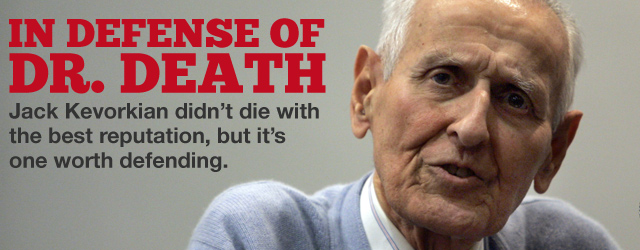U.S.: Defending Dr. Death: On Jack Kevorkian’s right-to-die legacy
- A complex ambassador for a complex debate: The death of Jack Kevorkian, which wasn’t artificial, is a great time to reflect on what he meant to an issue still fully unresolved to this day: The right-to-die debate. Jack was a purely Michigan icon, an idiosyncratic figure who defines the post-industrial shakiness and weirdness of the state the same way that two other purely Michigan icons of the era, Insane Clown Posse and Eminem, did — by taking a dark, tough-to-grasp issue or demeanor and just going for it, without worrying about the consequences. It led to over 100 assisted suicides that Kevorkian played a direct role in, a number of legal cases, a raised profile for lawyer Geoffrey Fieger (who actually made a failed gubernatorial run back in 1998), and finally, jail time for Kevorkian. While some criticize what Kevorkian did to this day, we think he represented an important role that actually got people to think about a real issue. More thoughts:
- Freedom of death One philosophy currently in vogue is libertarianism, which focuses on keeping the government as far away from our personal rights as possible. Is there a more libertarian idea than keeping the government out of our final affairs, instead of gumming up the works? The fact of the matter is, he worked with private citizens on private affairs that they agreed to. To us, it only seems fair to respect this. Maybe government shouldn’t be involved here?
- A changing society The concept of the hospice only grew in the wake of Kevorkian’s notoriety. The National Association of Home Care and Hospice notes that in 1990, the year Kevorkian completed his first assisted suicide, 76,000 people used Medicare Hospice Outlays. In 2008, the number topped 1 million for the first time. So, even if it isn’t exactly done Jack’s way, we are focusing on end-of-life issues more. And that’s a huge credit to him.
- Was he the right guy? Oakland County Executive L. Brooks Patterson reacted to Kevorkian’s death by suggesting that “the cause of aging and death with dignity is so complex that I don’t think Kevorkian was the right ambassador for that message.” But, really, that was the problem. Nobody was dealing with it on a serious scale until Jack came along. He put the issue in our faces until we finally started to take it seriously. That deserves our respect. source
